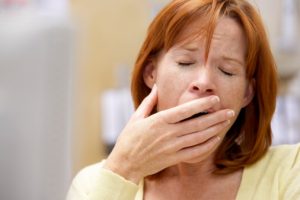 Chronic fatigue syndrome (CFS) is associated with early menopause, according to research. The association between CFS and menopause may help explained why CFS is far more common among women than men. Furthermore, being aware of the association may prompt healthcare workers to monitor women who may be at risk for CFS.
Chronic fatigue syndrome (CFS) is associated with early menopause, according to research. The association between CFS and menopause may help explained why CFS is far more common among women than men. Furthermore, being aware of the association may prompt healthcare workers to monitor women who may be at risk for CFS.
The study is based on the comparison of 84 women with CFS and 73 healthy control women who completed detailed questionnaires on their gynecologic history.
Advertisement
The women with CFS were 12 times more likely to have pelvic pain unrelated to menstruation, compared to the healthy women. CFS women were also more likely to report excessive bleeding, significant bleeding in-between periods, and missing periods. CFS-affected women were more likely to use hormones for purposes other than contraception, compared to the control women.
Furthermore, CFS women were more likely to have undergone at least one gynecologic surgery. They experienced menopause at an earlier age than the healthy women.
Executive director of the North American Menopause Society (NAMS) Margery Gass said, “CFS can take a tremendous toll on women’s lives at midlife and on our society and healthcare system. Being aware of the association of CFS and earlier menopause can help providers assist women in sorting out symptoms of CFS from symptoms of menopause.
The study did leave off with one question, though. Is early menopause the cause of later health problems or simply the result of earlier health problems not recognized as the cause of early menopause?
Tips to beat menopause and chronic fatigue syndrome
Advertisement
Fatigue is a common symptom of menopause and the primary problem in CFS. Fatigue can have you feeling low, making you unable to carry on with your daily tasks and impeding on your quality of life. Here are some tips to beat menopause fatigue and chronic fatigue syndrome:
- Exercise regularly even if you feel low energy – exercise actually promotes energy.
- Minimize caffeine and alcohol consumption – although these beverages may give you a bolt of energy at first, they can leave you feeling even more tired once they run their course.
- Limit your food portions – overeating can promote low energy and fatigue.
- Relax – stress can aggravate your fatigue.
- Get proper sleep – poor sleep can make you feel even worse, so put in extra effort to bring the quality of sleep up.
- Stay hydrated – better than coffee, water can actually keep you energized, while dehydration can lead to fatigue.
- Don’t overbook – spreading yourself too thin by running around between the appointments can cause greater fatigue.
By following these tips and working with your doctor on other remedies, you can better address the fatigue associated with menopause and CFS.
Sources:
http://www.everydayhealth.com/hs/guide-to-managing-menopause/8-energy-boosters-for-menopause-fatigue/
http://www.menopause.org/docs/default-source/2015/early-menopause-and-cfs.pdf

